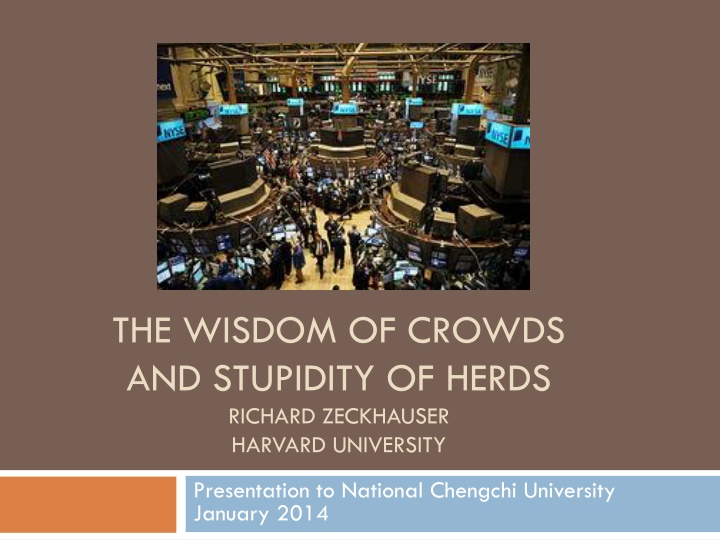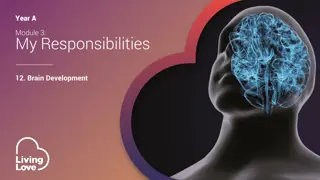Group Decision-Making: The Wisdom of Crowds and Stupidity of Herds
This presentation by Richard Zeckhauser of Harvard University delves into the importance of rational analysis and subjective probability in group decision-making processes. It emphasizes the need to focus on collective wisdom while avoiding biases that can affect group decisions. Key concepts covered include assigning subjective probabilities, filling in boxes, and tackling challenges in group decision-making, such as differences in probabilities and preferences. The goal is to engage participants in active decision-making and enhance the effectiveness of group decisions.
Download Presentation

Please find below an Image/Link to download the presentation.
The content on the website is provided AS IS for your information and personal use only. It may not be sold, licensed, or shared on other websites without obtaining consent from the author.If you encounter any issues during the download, it is possible that the publisher has removed the file from their server.
You are allowed to download the files provided on this website for personal or commercial use, subject to the condition that they are used lawfully. All files are the property of their respective owners.
The content on the website is provided AS IS for your information and personal use only. It may not be sold, licensed, or shared on other websites without obtaining consent from the author.
E N D
Presentation Transcript
THE WISDOM OF CROWDS AND STUPIDITY OF HERDS RICHARD ZECKHAUSER HARVARD UNIVERSITY Presentation to National Chengchi University January 2014
Goal of this Presentation Engage you in active decision making Many questions already at your place Focus on group decisions
Rational Analysis Probabilities are critical Subjective probability Bayesian analysis Choices depend on payoffs and probabilities NOT on Framing or Source of Uncertainty
Subjective Probability Probability: Subjective degree of belief in a proposition proposed by John Maynard Keynes in the early 1920s. Concept extended by Bruno de Finetti in Italy (Fondamenti Logici del Ragionamento Probabilistico, 1930) and Frank Ramsey in Cambridge, England (The Foundations of Mathematics, 1931)
Assigning Subjective Probabilities Worry about distributions, not just mean values Estimation task Know what you know, and you do not know
Filling in Boxes Best guess A number you think the true value is equally likely to be above or below. 1% surprise point A number you think it is only one chance in 100 that the true value is below. 99% surprise point A number you think it is only one chance in 100 that the true value is above.
Significant Focus Now will be on Group Decision Processes Most important decisions in most organizations are made through a group process. Frequently there is a discussion followed by consensus decision making. Group decisions can magnify individual behavioral biases. What can we do to: A. Get the benefit of the collective wisdom and judgment of the group? B. While avoiding the biases that afflict group decision making?
Group Decisions Differences in Probabilities No Yes Differences in Preferences No A. Simple Problem B. Syndicate Problem C. Arrow s Problem D. Big Challenge Yes Box D, Big Challenge, is where most group decisions land.
Group Decision Behavioral Decision Group Processes Interaction of Behavioral Decision and Group Processes
Behavioral Aspects of Group Decision Processes Group processes exacerbate behavioral propensities. Agreement on why your candidate will win. Reinforcing beliefs on why the business deal makes sense. Herding suppresses information. Guess the predominant color. Implication: Encourage alternative models and contrary evidence.
The Wisdom of Crowds and the Stupidity of Herds POSITIVE: On any question in this room, individuals have knowledge. If we could capture that knowledge effectively, we could make superior decisions. Central tendencies Crowd sourcing what products to produce NEGATIVES: 1. Many aggregation methods throw away information. The Slips Experiment. 2. Information may be conveyed through actions, and those actions can be costly. - Civil unrest, e.g., the Arab Spring. 3. Information aggregation gets mixed in with other motives. PERSONAL REWARD: Should the School of Information Science and Engineering develop a joint masters program with the School of Economics? Those most knowledgeable about prospects will have a personal interest in the outcome. APPEARING INTELLIGENT
Herding The tendency to change ones own action or response to be closer to the mean, median, or mode of the group. 1. Herding to reflect information gained. 2. Herding so as not to stand out. Political correctness. Appearance of being knowledgeable. When preferences and probabilities are involved. To assure loyalty (similar preferences). a. b. c.
THE FAT SEAGULLThe Current Salience of Behavioral Finance Stock Market February 2009 100% Housing 2007 Panic Euphoria Psychological versus Value Pricing Financial Assets January 2014 Financial Assets November 2012 0% 1 Low High Price/Value Ratio Relative to History or Recent Norms Frequency Fat-Tailed Distribution Price/Value Ratio
Herding can: 1. Be individually rational but collectively irrational 2. Suppress the revelation of information 3. Randomly push the group to an inferior equilibrium 4. Make it difficult to get a sense for a group s true preferences
Availability Heuristic (Difficult to recall all valid cases, whether vivid or not, from past) Frequency of event approximated by availability of its instances. Incorrect estimation of associations because recall of only selective combinations. Ex. Martin is analytic, regularly reads the Wall St. Journal, and invests his personal portfolio in a well-diversified portfolio of value stocks. What are the odds that Martin is a finance professor teaching MBAs as opposed to being a physician?
Only As Vote: What is the likelihood that he is in each profession? More than 90% that he is a finance professor teaching MBAs 70-90% that he is a finance professor teaching MBAs 51-70% that he is a finance professor teaching MBAs 50% that he is in either profession 51-70% that he is a physician 70-90% that he is a physician More than 90% that he is a physician. A. B. C. D. E. F. G. 0% 0% 0% 0% 0% 0% 0% A. B. C. D. E. F. G.
Bs: Please answer with clickers You have and will learn a variety of psychological principles and tools in these two lectures. Will you use these principles and tools to get your colleagues to agree to policies that are quite different than the ones that they would have agreed to if you did not use them? 1. YES 2. NO 0% 0%
As: Please answer with clickers - You are in the process of selling your car to a person you met via the Internet. He has inspected the car, and has agreed to come by to pick it up this afternoon in exchange for $8,000. You drove the car this morning and discovered that it had trouble starting. This is a mechanical problem that can be fixed for roughly $800. This info is not known to the buyer and will not be known until the sale has been completed and he has driven away (at which point the buyer will have paid and cannot do anything legal or otherwise to reverse the sale). Would you reveal this info to the buyer before the sale is made? - - - 1. YES 2. NO 0% 0%
Bs: Please answer with clickers The population of Turkey is more than 100 million people. A. YES B. NO 0% 0%
Zero Dark Thirty and Self Absorption President Obama had assembled a skeptical team. It said 40% likely. The agent in charge of the search (played by Jessica Chastain in the movie) said 95% likely. They had access to same information. Yet, they were much more influenced by what they had gathered themselves. Bin Laden s Lair?
Discounting the Information of Others Availability bias British Airways lost your luggage on a recent trip. You swear never to fly British Airways again. You actually abstain for a year. But your colleague, who believes you, is only marginally influenced. Hidden Agenda Heuristic Across a wide array of situations, others are providing you information to influence a decision in their direction. For example: prospective employee or salesmen. Thus, you come to believe you should trust your own information more than that from others. You employ this heuristic even when interests are fully aligned.
Conclusions Individuals fall prey to significant behavioral propensities when making decisions. These propensities are most salient when probabilities and/or significant negative payoffs are involved. Group processes, quite apart from behavioral propensities, frequently do a poor job of capitalizing on the available information. Group processes often compound behavioral propensities. ??? Group decision is a double-edged sword.























